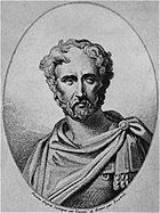
, naturalist
, and natural philosopher, as well as naval and army commander of the early Roman Empire
, and personal friend of the emperor Vespasian
. Spending most of his spare time studying, writing or investigating natural and geographic phenomena in the field, he wrote an encyclopedic work, Naturalis Historia, which became a model for all such works written subsequently.
Fortune favours the brave…![]()
In comparing various authors with one another, I have discovered that some of the gravest and latest writers have transcribed, word for word, from former works, without making acknowledgment.![]()
The only certainty is that nothing is certain.![]()
It is far from easy to determine whether she [Nature] has proved to man a kind parent or a merciless stepmother.![]()
Man alone at the very moment of his birth, cast naked upon the naked earth, does she [Nature] abandon to cries and lamentations.![]()
To laugh, if but for an instant only, has never been granted to man before the fortieth day from his birth, and then it is looked upon as a miracle of precocity.![]()
Man is the only one that knows nothing, that can learn nothing without being taught. He can neither speak nor walk nor eat, and in short he can do nothing at the prompting of nature only, but weep.![]()
With man, most of his misfortunes are occasioned by man.![]()
Indeed, what is there that does not appear marvelous when it comes to our knowledge for the first time? How many things, too, are looked upon as quite impossible until they have actually been effected?![]()
The human features and countenance, although composed of but some ten parts or little more, are so fashioned that among so many thousands of men there are no two in existence who cannot be distinguished from one another.![]()

